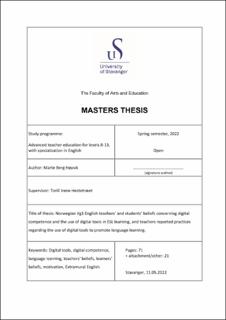| dc.description.abstract | The current thesis aimed to explore Norwegian upper secondary school teachers’ and students’ beliefs concerning the use of digital tools and ESL learning. In addition, it aimed to investigate which digital tools Vg1 ESL teachers report that they use to promote English learning and why. The study investigated the teachers’ reported practices when it comes to digital tools and why they use them. Finally, the current thesis aimed to investigate what the concept digital competence means for both teachers and students.
To gather the data, the study employed a mixed methods research design, including teacher interviews and a student questionnaire. Four Vg1 English teachers from two separate Norwegian upper secondary schools were interviewed to investigate teachers’ beliefs and their reported practices concerning the use of digital tools to promote ESL learning. In addition, four Vg1 classes from two separate schools participated in a questionnaire in order to gain a perspective of the students’ beliefs. In total, 121 students responded to the questionnaire.
The findings demonstrated overall positive beliefs concerning the use of digital tools in ESL learning from both teachers’ and learners’ perspectives. Both the teachers and the students reported that digital tools are useful within the English subject. While some teachers reported that they primarily use digital tools to visualize, other teachers reported that they use digital tools as primary sources to create varied lessons and to find authentic teaching material suited to the students’ level and interests.
Although the study found overall positive beliefs, some challenges with the use of digital tools and ESL learning were also addressed by the teachers and the learners. The main reported challenges are the distractions that come with the use of digital tools.
The present study contributes within the field of L2 English to gain a better understanding of teachers’ and students’ beliefs concerning the use of digital tools in ESL learning. It contributes to this growing field by exploring it from both the teachers’ and the students’ perspectives. Further, the current study investigates how teachers’ beliefs are reflected in their reported practices. Furthermore, it aims to get an overview of which digital tools the teachers report that they use and why. Finally, the present study contributes by exploring what the concept digital competence in LK20 means for teachers and learners.
The main teaching implications proposed by the findings of the current study concerns how digital tools are being used in ESL learning. The use of digital tools can increase the students’ motivation to learn. Hence, digital tools should be used in order to promote ESL learning. The students reported that they learn English by playing digital games and by using social media. These activities could be used within the English subject as teachers are free to choose teaching methods as long as it is in line with the curriculum.
Further studies are recommended in order to gain more knowledge about this important topic. Moreover, LK20 was recently implemented, meaning that there is a low amount of knowledge about how teachers and learners alike interpret key digital concepts in the curriculum. Thus, further studies could investigate how both teachers and students interpret other key digital concepts in LK20. | |
